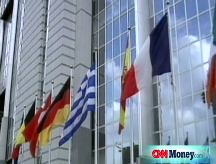Dollar retreats against the euro, pound
Greenback remains under pressure despite grim readings on Europe's economy and a selloff on Wall Street.
NEW YORK (CNNMoney.com) -- The dollar weakened against the euro and the pound Friday, as investors' appetite for risk remained high despite grim readings on Europe's economy and falling U.S. stock prices.
The dollar was moderately higher versus the euro, with the shared currency trading at $1.2865 from $1.2854 late Thursday in New York.
The pound, however, rose against the dollar amid reports that European finance ministers may discuss plans to prop up the British currency during a Group of Seven meeting in Rome. Sterling traded 0.8% higher against the dollar at $1.4386 after climbing more than 1% earlier in the session.
Both the euro and the pound tumbled earlier Friday morning after European finance ministers said economic growth shrank more than expected in the last quarter of 2008.
Eurostat, the European Union's statistics office, said gross domestic product in the 15 countries using the euro shrank 1.5% from the previous quarter, worse than forecasts for a 1.3% drop.
But the grim readings did not deter European stock investors. Major indexes in Paris and Germany rallied, while London ended slightly lower. Asian markets advanced, closing higher after a five-day losing streak.
On Wall Street, stocks tumbled despite news that House lawmakers passed a $789 billion economic stimulus plan. The Senate is expected to vote on the plan later Friday, and President Obama could sign it into law next week.
"Buoyant equities have helped to induce strong U.S. dollars selling," notes Sacha Tihanyi, currency strategist at Scotia Capital in Toronto, in a research report.
Many investors view the dollar as a safe haven. As a result, the dollar often gains ground when stock prices fall and investors shy away from more risky assets. Conversely, the dollar normally weakens when stocks rally, as investors seek out higher returns.
Japan's yen, which is also considered a safe haven, fell more than 1% against the dollar to trade at ¥91.97. Against the euro, the yen slid 1.2% to ¥118.35.
Friday's retreat reiterates how tied the U.S. dollar is to the equity market, Tihanyi said. However, it is unclear whether the optimism about rising stock prices will be enough to continue suppressing the U.S. dollar throughout the session, he added. ![]()



